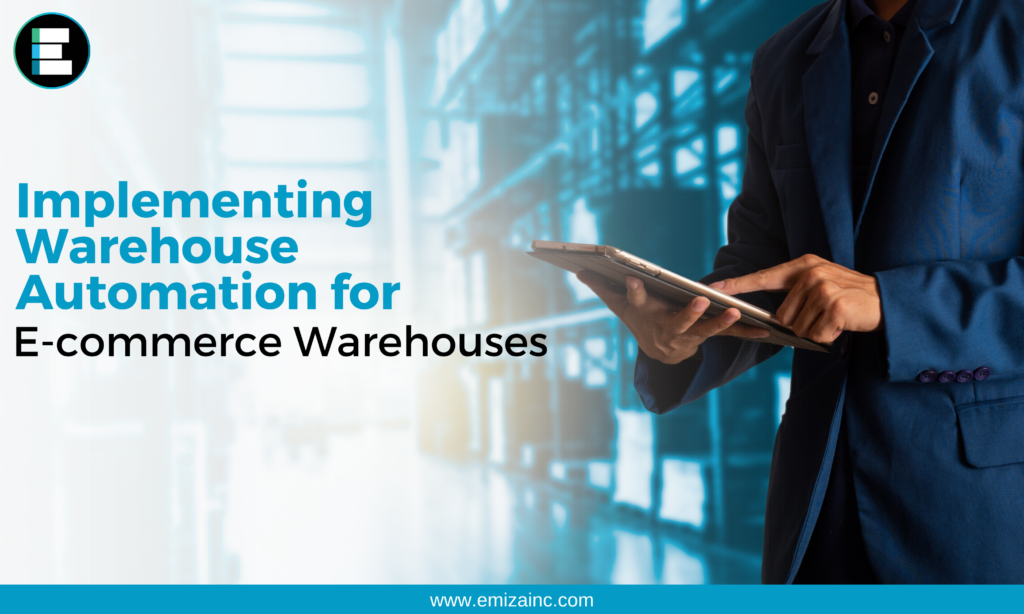E-commerce warehouse automation is a game-changer when it comes to boosting logistics performance. Companies that embrace the Industrial Internet of Things (IIoT), artificial intelligence (AI), and machine learning are able to maximise operational productivity and provide efficient service to their customers.
The market for warehouse automation is experiencing significant growth. According to a report by technology consulting firm ABI Research, the warehouse automation market is expected to reach $51 billion by 2023, with a compound annual growth rate (CAGR) of 23%. This highlights the increasing adoption of automated solutions in the warehousing industry.
McKinsey’s analysis emphasises how e-commerce warehouse automation enables companies to tackle the dynamic challenges of the sector. Technologies such as automated guided vehicles (AGVs) and autonomous mobile robots (AMRs) have proven their effectiveness at addressing issues like labour shortages, SKU-complexity growth, and rising service expectations in traditional e-commerce warehouses.
To make informed decisions about warehouse automation, retailers need to understand where it can add value, reduce risk, and improve reliability within their fulfilment networks. McKinsey recommends a three-step process—strategy, design, and implementation—to translate the vision of an optimal automated warehouse into reality.
Benefits of E-Commerce Warehouse Automation
Implementing automation in an e-commerce facility can enhance several logistics operations, particularly repetitive tasks like goods movements and order picking. Here are some advantages of e-commerce warehouse automation:
High Productivity: Automated storage and order-picking systems significantly improve the efficiency of storing, retrieving, and transporting goods within the facility. This leads to higher throughput and streamlined workflows.
Continuous Operations: With automation, e-commerce warehouses can operate 24/7 without interruptions. Continuous workflows ensure faster order processing and improved customer service.
Error Elimination: Automated systems minimise errors throughout various operations, including goods receipt, order picking, and dispatch. This leads to improved accuracy and reduced customer dissatisfaction.
Increased Storage Capacity: Automation allows warehouses to maximise their available surface area by optimising storage space. Additionally, implementing handling equipment like stacker cranes enables warehouses to utilise vertical space effectively.
Enhanced Safety: Automated systems prioritise safety for both operators and the materials being handled. With automated processes, the risk of accidents and injuries is significantly reduced.
Adaptability to Customer Requirements: E-commerce automation enables warehouses to adjust their processes to meet specific customer demands. This flexibility helps online stores gain a competitive edge and effectively handle increased order volumes.
Emiza’s Seamless Automation
With its seamless and integrated tech stack, Emiza takes warehouse automation to the next level. Our comprehensive solution is designed to optimise e-commerce warehouse operations, providing efficiency, accuracy, and enhanced customer satisfaction.
- Emiza helps your business achieve touchless product delivery using advanced conveyor technology, ensuring safety and efficiency.
- Our systematic bin storage solution for clothes optimises inventory management, enabling easy access and retrieval.
- Emiza’s warehouse racking system facilitates effective labelling and tracking of items, streamlining operations for better organisation.
- With faster and more convenient picking processes, Emiza’s automation solutions enhance productivity and reduce errors in your business operations.
- Emiza’s automation solution integrates with leading shipping carriers and logistics providers, streamlining the shipping process and enhancing cost-effectiveness for faster delivery and improved customer satisfaction.
- Emiza’s Warehouse Management System (WMS) optimises inventory management, order fulfilment, and warehouse operations with real-time visibility, ensuring efficient workflows and exceptional customer service.
- Emiza’s automation solution seamlessly integrates with major ERP and accounting systems, automating data synchronisation to streamline financial processes, improve accuracy, and gain better operational control.
With Emiza’s efficient warehouse management system, we excel in bulk order processing, sorting, and consolidation, guaranteeing streamlined fulfilment. Our automation solution optimises operational processes, eliminates manual tasks, and improves overall efficiency, allowing businesses to focus on strategic growth and delivering exceptional customer experiences.
Conclusion
In conclusion, e-commerce warehouse automation is a vital tool for businesses looking to enhance their logistics performance. Implementing automation in an e-commerce facility brings numerous advantages, including increased productivity, continuous operations, error elimination, enhanced storage capacity, safety, and adaptability to customer requirements.
For those businesses seeking a comprehensive automation solution, Emiza’s seamless and integrated tech stack offers a game-changing approach. The interconnected ecosystem, integration with marketplaces and shipping providers, enterprise-grade WMS, and compatibility with major ERP and accounting systems ensure streamlined operations and exceptional customer satisfaction.
To learn more about Emiza’s warehouse automation solutions and to optimise your e-commerce fulfilment processes, visit the website https://emizainc.com/. Embrace the future of warehouse automation and unlock the full potential of your e-commerce business.

